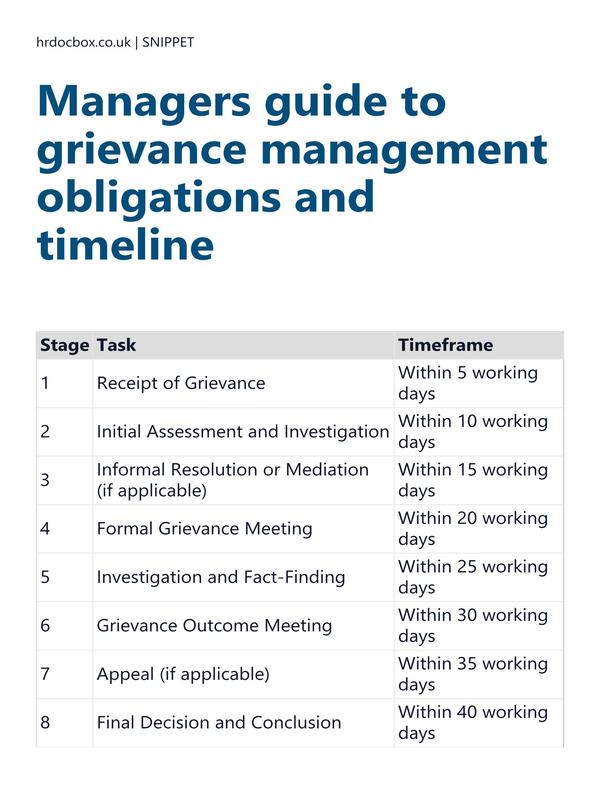Managers guide to grievance management obligations and timeline


This guide provides employers with a clear roadmap for handling employee grievances, promoting fairness, compliance, and a positive work environment.
- Includes 12 months' access to the Managers guide to grievance management obligations and timeline, with all updates provided free of charge and notified to you.
- UK-specific accuracy.
- 158 words over 1 page.
- Last updated 21/05/2023.
- Format: Word / PDF / plain text / email.
- Delivery: Instant download after purchase (no physical item).
- Access: Download link shown here after checkout.
- This Managers guide to grievance management obligations and timeline will SAVE you up to 30 mins research, save you money, and reduce your risk.
Managers guide to grievance management obligations and timeline
| Stage | Task | Timeframe |
| 1 | Receipt of Grievance | Within 5 working days |
| 2 | Initial Assessment and Investigation | Within 10 working days |
| 3 | Informal Resolution or Mediation (if applicable) | Within 15 working days |
This is a 30% preview of the Managers guide to grievance management obligations and timeline. For instant full access, purchase this item or a parent bundle.
Managers guide to grievance management obligations and timeline purpose
The purpose of this guide is to provide employers with a structured framework for effectively managing employee grievances. It outlines the stages, tasks, and timeframes involved in addressing and resolving grievances in a fair and timely manner.
By following this guide, employers can ensure compliance with employment laws, promote transparency, and foster a positive work environment through the proper handling of employee concerns.
Frequently Asked Questions about a Managers guide to grievance management obligations and timeline
Frequently Asked Questions about a Managers guide to grievance management obligations and timeline
-
Can I use the Managers guide to grievance management obligations and timeline in my small business?
Yes. The Managers guide to grievance management obligations and timeline is designed to be flexible and suitable for organisations of all sizes, including small businesses and charities. It follows UK employment law best practice, so even if you don't have an in-house HR team, you can confidently apply it.
-
Is the Managers guide to grievance management obligations and timeline compliant with 2026 UK employment law?
Absolutely. Like the Managers guide to grievance management obligations and timeline, all of our templates are drafted with the latest ACAS guidance and UK employment legislation in mind. We review and update them regularly, so you can be confident they remain compliant.
-
Can I customise the Managers guide to grievance management obligations and timeline for my organisation?
Yes, we highlight the areas of the Managers guide to grievance management obligations and timeline that you need to update with your own details, and where you need to make decisions to suit your situation. This saves you time and ensures that you meet best practice.
-
Do I get instant access to the Managers guide to grievance management obligations and timeline?
Yes. Once purchased, you'll be able to download the Managers guide to grievance management obligations and timeline instantly. Templates are provided in editable Word or Excel format so you can customise them easily, and in PDF format for easy sharing.
-
What if I need more help, not just a Managers guide to grievance management obligations and timeline?
If you're looking for broader support, we also offer toolkits and library bundles that include the Managers guide to grievance management obligations and timeline, along with other HR templates and policies for fully managing your situation. These may be more cost-effective if you need deeper advice.
-
Why should I use this Managers guide to grievance management obligations and timeline, and not AI to generate it?
The risk of using a free AI-generated template 'without review' includes your legal exposure, missing context, and no awareness of the wider process, whereas purchasing the Managers guide to grievance management obligations and timeline from us mitigates that risk.
